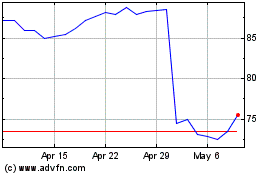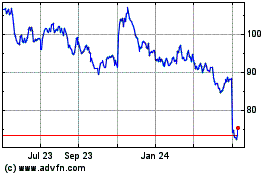Today's Logistics Report: Exports Pull Back; Brexit's Inventory Build; Getting Coffee to Go
December 14 2018 - 12:57PM
Dow Jones News
By Paul Page
Sign up: With one click, get this newsletter delivered to your
inbox.
Trade tensions are starting to show up in outbound business at
U.S. ports. Seaborne exports at the big Southern California gateway
ports took a dive last month, the WSJ Logistics Report's Erica E.
Phillips writes, in a new sign of the volatile impact tit-for-tat
tariffs between the U.S. and China is having on container trade
flows. Outbound container volume at the neighboring ports of Los
Angeles and Long Beach fell 11.8% in November from a year ago. It
was the first decline after seven straight months of annual growth
in exports. Exports at the Port of Oakland were flat, meantime,
while they fell 4.4% at Georgia's Port of Savannah, the East
Coast's second-largest gateway. The drop follows sharp swings in
import container volume, which peaked early this year as companies
pulled forward shipments to get ahead of new rounds of tariffs.
Preparations at British and European companies for a chaotic
Brexit are growing more urgent. Firms in the aviation, car,
pharmaceuticals and food industries have already been stocking up
on crucial ingredients and components, the WSJ's Nina Trentmann
reports, adding on average a month of working capital to their
balance sheets. The efforts are intensifying with political
showdowns in London that have left British Prime Minister Theresa
May seeking new concessions from the European Union to win over
testy lawmakers. German auto maker Volkswagen AG is among those
creating buffer stocks in case of border disruptions, but Chief
Financial Officer Frank Witter cautions there are "limited
opportunities for stock and inventory building." Car parts and
logistics operator Unipart Group Ltd. warns that tight warehouse
capacity is making stockpiling too expensive. And piling up
inventory carries still greater risk if demand for the goods falls
off.
Those increasingly crowded food delivery lanes are going to get
more caffeinated. Starbucks Corp. is teaming up with Uber
Technologies Inc.'s UberEats operation to expand coffee delivery
across the U.S., the WSJ's Julie Jargon reports, adding a new
big-brand wrinkle to the booming business of delivering food to
where consumers live and work. Delivery is becoming a source of
added sales for many restaurant chains that have seen their dining
room traffic erode. Many chains say delivery has attracted
customers who don't come in to eat. The new plan creates more of
what shipping experts call density for Uber, which will be able to
spread costs in its profitable UberEats unit across more
deliveries. But the challenges in delivering food quickly and fresh
are even greater for coffee, and delivery fees are likely to be a
turnoff for customers placing small orders.
COMMODITIES
Commodities markets are sending worrying signals about global
economic demand. Prices for key raw materials like iron ore, copper
and lumber are on track to notch big declines this year, the WSJ's
Ira Iosebashvili reports, and measures of broader commodity markets
are also down as global-trade tensions and a persistently strong
dollar hammer prices for raw materials. The drops are driven by
fears that trade tensions between the U.S. and China will hit
global growth while expansion outside of the U.S. is already
lackluster and China faces limited options to stimulate its
economy. Experts say buyers are trying to avoid risk in a
politically tense environment, but signs that industrial demand is
sagging could create a drag on shipping. The dry bulk market
focused on raw materials has been rebounding in recent weeks, with
the Baltic Dry Index up about 35% since hitting a seven-month low
in November.
QUOTABLE
IN OTHER NEWS
Industrial production in China slowed in November to its lowest
level since early 2016. (WSJ)
Whole Foods is severing ties with delivery service Instacart
Inc. (WSJ)
Costco Wholesale Corp.'s sales increased more than 10%, short of
expectations. (WSJ)
Home improvement retailer Lowe's Cos. projects 2% overall sales
growth in the coming year. (WSJ)
General Electric Co. will sell off part of its GE Digital
business and set aside the rest in a separate company. (WSJ)
Regulators identified one source of the latest E. coli outbreak
linked to romaine lettuce. (WSJ)
U.S. footwear companies are shifting sourcing from China because
of ongoing trade tensions. (Sourcing Journal)
A new study says U.S. manufacturers are paying 17.2% more than
their foreign competitors for hot- and cold-rolled steel. (Industry
Week)
XPO Logistics Inc.'s stock dived 26% on a short-seller's
negative report on the company. (Barron's)
The U.S. fined a Chinese oilfield equipment supplier $2.7
million for illicit exports to Iran. (American Shipper)
South Carolina will spend $61.4 million to buy new cranes to
handle bigger container ships at the Port of Charleston. (Post and
Courier)
Container throughput at the Port of Singapore rose 9% in the
first 11 months of the year. (Seatrade Maritime)
Hapag-Lloyd AG will resume service at the Port of Felixstowe
that it halted after a troubled technology rollout at the U.K.
gateway. (The Loadstar)
Delta Air Lines Inc. stopped taking freight shipments for a time
this week after trouble with a new technology system. (Atlanta
Journal-Constitution)
Norfolk Southern Corp. formally announced it will move its
headquarters from Virginia to Atlanta. (Progressive
Railroading)
China's freight rail volume growth accelerated to 10.1% in
October. (RailFreight)
A report forecasts the biggest buyers of liquefied natural gas
could quadruple orders by 2030. (Shipping Watch)
Ship manager Anglo-Eastern fired a chemical tanker captain set
to sail from New Zealand while three times over the legal alcohol
limit. (Splash 247)
ABOUT US
Paul Page is editor of WSJ Logistics Report. Follow him at
@PaulPage, and follow the entire WSJ Logistics Report team:
@JenSmithWSJ , @EEPhillips_WSJ and @CostasParis. Follow the WSJ
Logistics Report on Twitter at @WSJLogistics.
Write to Paul Page at paul.page@wsj.com
(END) Dow Jones Newswires
December 14, 2018 12:42 ET (17:42 GMT)
Copyright (c) 2018 Dow Jones & Company, Inc.
Starbucks (NASDAQ:SBUX)
Historical Stock Chart
From Mar 2024 to Apr 2024

Starbucks (NASDAQ:SBUX)
Historical Stock Chart
From Apr 2023 to Apr 2024
